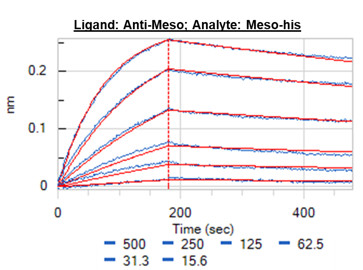Human Mesothelin Antibody Summary
Glu296-Asp580
Accession # AAH09272
Applications
This antibody functions as an ELISA detection antibody when paired with Mouse Anti-Human Mesothelin Monoclonal Antibody (Catalog # MAB32653).
This product is intended for assay development on various assay platforms requiring antibody pairs. We recommend the Human Mesothelin DuoSet ELISA Kit (Catalog # DY3265) for convenient development of a sandwich ELISA or the Human Mesothelin Quantikine ELISA Kit (Catalog # DMSLN0) for a complete optimized ELISA.
Please Note: Optimal dilutions should be determined by each laboratory for each application. General Protocols are available in the Technical Information section on our website.
Scientific Data
 View Larger
View Larger
Human Mesothelin ELISA Standard Curve. Recombinant Human Mesothelin protein was serially diluted 2-fold and captured by Mouse Anti-Human Mesothelin Monoclonal Antibody (Catalog # MAB32653) coated on a Clear Polystyrene Microplate (Catalog # DY990). Mouse Anti-Human Mesothelin Monoclonal Antibody (Catalog # MAB32654) was biotinylated and incubated with the protein captured on the plate. Detection of the standard curve was achieved by incubating Streptavidin-HRP (Catalog # DY998) followed by Substrate Solution (Catalog # DY999) and stopping the enzymatic reaction with Stop Solution (Catalog # DY994).
Reconstitution Calculator
Preparation and Storage
- 12 months from date of receipt, -20 to -70 °C as supplied.
- 1 month, 2 to 8 °C under sterile conditions after reconstitution.
- 6 months, -20 to -70 °C under sterile conditions after reconstitution.
Background: Mesothelin
Mesothelin, also known as CAK1 and ERC, is derived from a 70 kDa precursor that also includes Megakaryocyte Potentiating Factor (MPF) (1-3). The 70 kDa precursor is expressed on the cell surface where it is cleaved at a dibasic proteolytic site to release the 32 kDa glycosylated MPF (3, 4). MPF is a cytokine that potentiates IL-3 induced megakaryocyte colony formation (2, 5). The term Mesothelin refers to the 40 kDa glycosylated protein which remains attached to the cell surface via a GPI linkage. Alternate splicing generates additional Mesothelin isoforms that have either an eight amino acid insertion following Ser408 or a substituted C-terminal region with no GPI anchor (6). Within aa 29-580, human Mesothelin shares 59% sequence identity with mouse and rat Mesothelin. Mesothelin is normally expressed on mesothelial cells in the pleura, pericardium, and peritoneum as well as in the developing and postnatal pancreas (1, 7). It is upregulated in mesotheliomas and a range of carcinomas and adenomas (8-11). Mesothelin promotes tumor cell proliferation, migration, anchorage-independent growth, and tumor progression (10, 12). It is coexpressed with the tumor antigen CA125/MUC16 on advanced ovarian adenocarcinomas and interacts with this molecule to support cell adhesion (13). A soluble form of Mesothelin is released from tumor cells into the serum or tissue effusions (11, 14, 15).
- Hassan, R. et al. (2004) Clin. Cancer Res. 10:3937.
- Kojima, T. et al. (1995) J. Biol. Chem. 270:21984.
- Chang, K. and I. Pastan (1996) Proc. Natl. Acad. Sci. 93:136.
- Onda, M. et al. (2006) Clin. Cancer Res. 12:4225.
- Yamaguchi, N. et al. (1994) J. Biol. Chem. 269:805.
- Muminova, Z.E. et al. (2004) BMC Cancer 4:19.
- Hou, L.-Q. et al. (2008) Develop. Growth Differ. 50:531.
- Ordonez, N.G. (2003) Mod. Pathol. 16:192.
- Argani, P. et al. (2001) Clin. Cancer Res. 7:3862.
- Li, M. et al. (2008) Mol. Cancer Ther. 7:286.
- Scholler, N. et al. (1999) Proc. Natl. Acad. Sci. 96:11531.
- Uehara, N. et al. (2008) Mol. Cancer Res. 6:186.
- Rump, A. et al. (2004) J. Biol. Chem. 279:9190.
- Ho, M. and M.O. Lively (2006) Cancer Epidemiol. Biomarkers Prev. 15:1751.
- Robinson, B.W.S. et al. (2003) Lancet 362:1612.
Product Datasheets
FAQs
No product specific FAQs exist for this product, however you may
View all Antibody FAQsReviews for Human Mesothelin Antibody
Average Rating: 4 (Based on 1 Review)
Have you used Human Mesothelin Antibody?
Submit a review and receive an Amazon gift card.
$25/€18/£15/$25CAN/¥75 Yuan/¥2500 Yen for a review with an image
$10/€7/£6/$10 CAD/¥70 Yuan/¥1110 Yen for a review without an image
Filter by:


